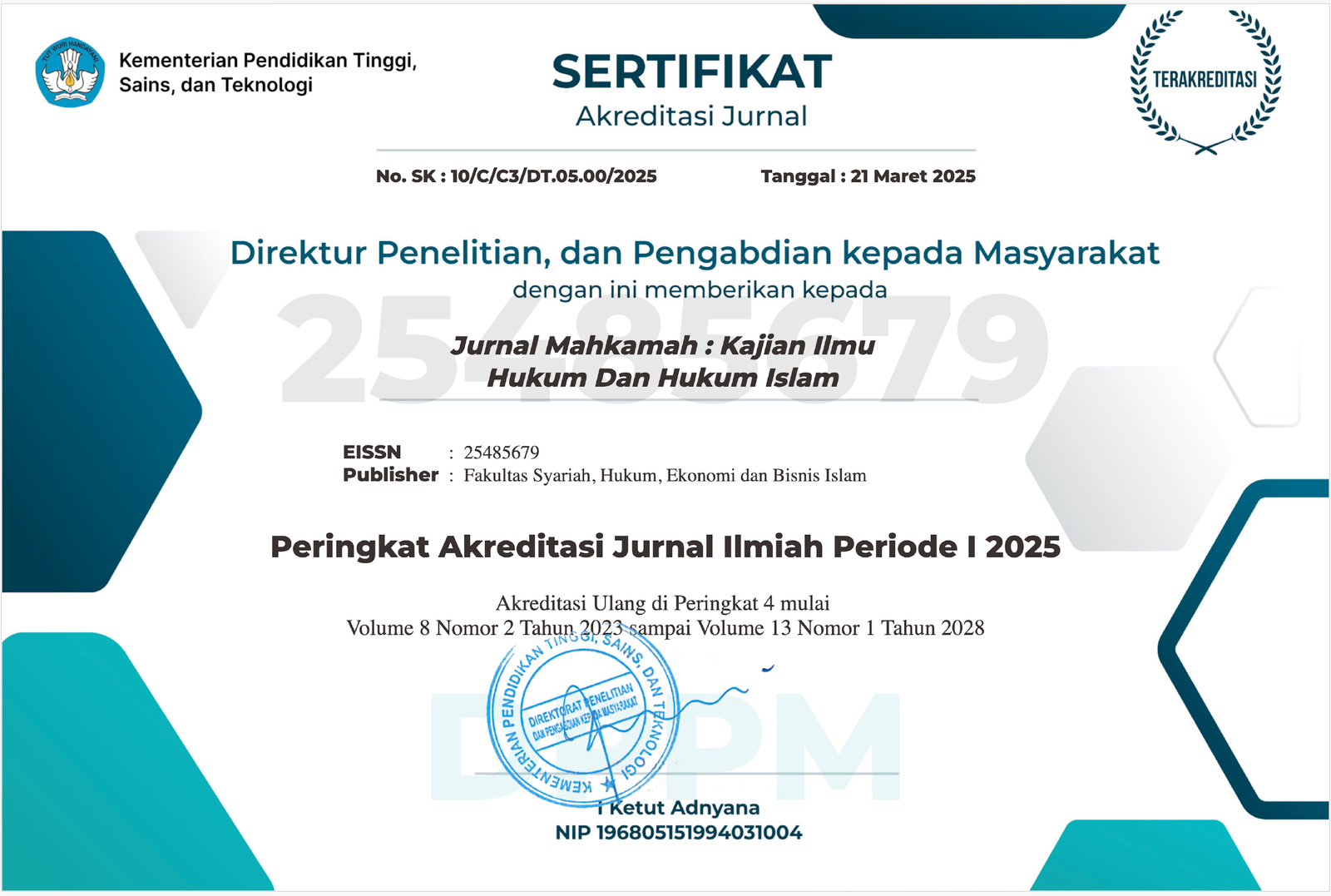Dilematics of Domestic Husbands in Marriage in Singapore (Maqashid Sharia Perspective)
DOI:
https://doi.org/10.25217/jm.v9i2.2331Keywords:
Gender Role, Family Welfare, Household Husband, Maqasid Sharia, SingaporeAbstract
This study examines the phenomenon of domestic husbands in marriage in Singapore using the perspective of maqasid al-shari'ah, to understand the dilemma of the role of husbands in modern families. The main objective of this study is to explore the reasons behind the change in the role of the husband, who was previously the main breadwinner, to be the husband of the household, as well as how this relates to Islamic principles that emphasize family welfare. Through a quantitative and qualitative approach, this study analyzed interviews with several part-time and full-time working domestic husbands, as well as a survey that explored the social, economic, and cultural factors that influence these changes. The results of the study show that the role of the husband in the household not only includes financial responsibility, but also social, emotional, and spiritual aspects in shaping family well-being. In the perspective of maqasid al-shari'ah, the husband's responsibility is more than just financial support, but also includes the maintenance and protection of the family in various dimensions of life. This study provides new insights into understanding the role of domestic husbands in the context of modern families in Singapore, as well as the relevance of the application of maqasid al-shari'ah in the face of evolving social dynamics.
References
Amrullah, Arief. 2018. Perkembangan Kejahatan Korporasi. Prenada Media.
Ardiansyah, Randi, Berti Mandala Putra, and Widia Widia. 2023. “Kondisi Sosial Ekonomi Dan Pendidikan Anak Pada Rumah Tangga Tenaga Kerja Wanita (TKW).” JISIP (Jurnal Ilmu Sosial Dan Pendidikan) 7, no. 1: 321–31.
Badruddin, Syamsiah. n.d. Sosiologi Keluarga: Dinamika Dan Tantangan Masyarakat Modern. PT. Sonpedia Publishing Indonesia.
Hadaiyatullah, Syeh Sarip, Arif Fikri, Dharmayani Dharmayani, Eti Karini, and Habib Ismail. 2024. “Rekontekstualisasi Fikih Keluarga Di Era Modern: Studi Perbandingan Indonesia, Tunisia, Dan Turki.” Moderasi: Journal of Islamic Studies 4, no. 2.
Hermanto, Agus, and Habib Ismail. 2020. “Criticism of Feminist Thought on the Rights and Obligations of Husband and Wife from the Perspective of Islamic Family Law.” J. Islamic L. 1: 182.
Kharlie, Ahmad Tholabi, and M H Sh. 2020. Kodifikasi Hukum Keluarga Islam Kontemporer: Pembaruan, Pendekatan, Dan Elastisitas Penerapan Hukum. Prenada Media.
Mustika, Amalia, Timotius Agus Rachmat, and Asep Syaiful Bahri. 2013. “Pola Pengambilan Keputusan Serta Peran Dan Curahan Kerja Wanita Dalam Meningkatkan Pendapatan Rumah Tangga Di Daerah Tujuan Wisata.” Jurnal Ilmiah Pariwisata 18, no. 3: 231–45.
Mustofa, Amin, and Iskandar Wibawa. 2024. “Tinjauan Maqashid Asy-Syari’ah Terhadap Perceraian Karena Alasan Ekonomi.”
Pujarama, Widya, and Ika Rizki Yustisia. 2020. Aplikasi Metode Analisis Resepsi Untuk Penelitian Gender Dan Media: Untuk Peneliti Pemula Dan Mahasiswa S-1. Universitas Brawijaya Press.
Risbyantoro, Hendro, Fitri Mutiah Salsa Bela, and Delfa Firdaus. 2023. “Peran Istri Sebagai Pencari Nafkah Utama Dalam Perspektif Maqashid Al-Syari’ah.” Sahaja: Journal Sharia and Humanities 2, no. 2: 198–211.
Sari, Rahma Pramudya Nawang, and Anton Anton. 2020. “Wanita Karier Perspektif Islam.” SANGAJI: Jurnal Pemikiran Syariah Dan Hukum 4, no. 1: 82–115.
Sedayu, Rahmat Agung. 2022. “Muhammad Syahrur’s Thoughts on Inheritance from the Maqasid Al-Shari’ah Perspective and Hermeneutics.” Jurnal Mahkamah: Kajian Ilmu Hukum Dan Hukum Islam 7, no. 1: 1–14.
Shofyan, Muhammad. n.d. “Penerapan Hukum Oleh Hakim Pengadilan Agama Surabaya Dalam Pembagian Harta Bersama Berdasarkan Konsep Maslahat Dan Keadilan.” Fakultas Syariah dan Hukum Universitas Islam Negeri Syarif Hidayatullah Jakarta.
Siregar, Syahrina, and Ibnu Radwan Siddik Turnip. 2023. “Anak Jalanan Pencari Nafkah Untuk Keluarga Ditinjau Dari Maqashidus Syari’ah.”
Sufi’y, Mhd, M Muslih, and Ahmad Khotim. 2024. “Implikasi Maqasid Syariah Terhadap Pilihan Reproduksi: Studi Tentang Childfree Di Era Modern.” Bulletin of Islamic Law 1, no. 2: 73–82.
Udasmoro, Wening. 2018. Dari Doing Ke Undoing Gender: Teori Dan Praktik Dalam Kajian Feminisme. UGM PRESS.
Ulya, Nadiya, and Raden Rachmy Diana. 2021. “Peran Pola Asuh Orang Tua Dalam Meningkatkan Kepercayaan Diri Pada Anak Usia.” Jurnal Golden Age 5, no. 2: 304–13.
Zakariah, M Askari, Vivi Afriani, and K H M Zakariah. 2020. Metodologi Penelitian Kualitatif, Kuantitatif, Action Research, Research And Development (R n D). Yayasan Pondok Pesantren Al Mawaddah Warrahmah Kolaka.
Downloads
Published
How to Cite
Issue
Section
License
Copyright (c) 2024 syukri albani

This work is licensed under a Creative Commons Attribution-ShareAlike 4.0 International License.
This work is licensed under a Creative Commons Attribution-ShareAlike 4.0 International License.
Authors retain copyright and grant the Jurnal Mahkamah : Kajian Ilmu Hukum Dan Hukum Islam right of first publication with the work simultaneously licensed under a Creative Commons Attribution License (CC BY-SA 4.0) that allows others to share (copy and redistribute the material in any medium or format) and adapt (remix, transform, and build upon the material) the work for any purpose, even commercially with an acknowledgment of the work's authorship and initial publication in Jurnal Mahkamah : Kajian Ilmu Hukum Dan Hukum Islam.
Authors are able to enter into separate, additional contractual arrangements for the non-exclusive distribution of the journal's published version of the work (e.g., post it to an institutional repository or publish it in a book), with an acknowledgment of its initial publication in Jurnal Mahkamah : Kajian Ilmu Hukum Dan Hukum Islam.
Authors are permitted and encouraged to post their work online (e.g., in institutional repositories or on their website) prior to and during the submission process, as it can lead to productive exchanges, as well as earlier and greater citation of published work (See The Effect of Open Access).









